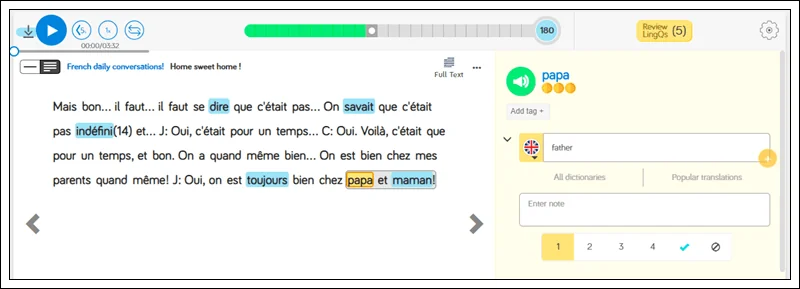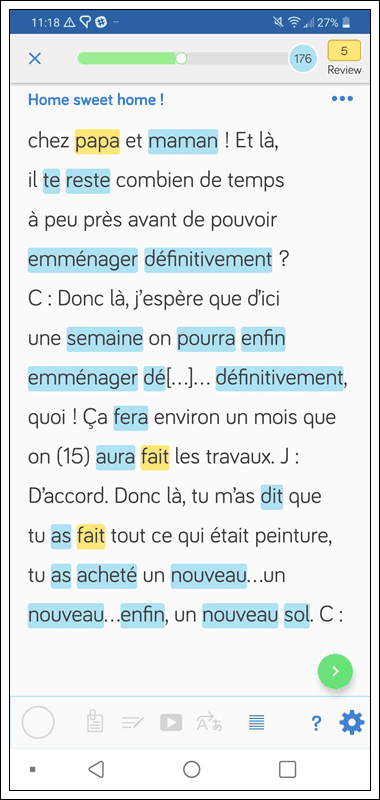6 French Sayings You Should Know
That Dior handbag is going to cost the eyes out of your head! Your coworker entered the conversation like a hair in the soup. Little by little, the bird makes its nest. Sound like a foreign language? It is! Those are the English translations of some common French idioms and proverbs.
An idiom is an expression whose meaning can’t be deduced based on its individual words, yet everyone still knows what the saying means. In English we might say it’s raining cats and dogs during a thunderstorm, while the French say il pleut des cordes (it’s raining ropes). Since idioms can’t be translated literally, they generally have to be memorized – but using one of these sayings correctly can help you sound more like a native speaker!
Here are some common French idioms and how to use them.

French idioms
Appeler un chat un chat
Or “to call a cat a cat” is the French equivalent of “to call a spade a spade”. It means that you call it like it is, or that you’re not afraid to speak your mind.
Vous devez écouter ce qu’elle dit, elle appelle toujours un chat un chat.
You should listen to what she says, she always tells it like it is.
Arriver comme un cheveu sur la soupe
“Arriving like a hair in the soup” means that you’ve entered a situation at the worst possible time.
Arnaud était en train de draguer une fille au café quand son copain est arrivé – comme un cheveu sur la soupe.
Arnaud was flirting with a girl at a café when her boyfriend arrived – at the worst moment.
Coup de foudre
“A flash of lightning” – that’s how quickly one can be struck by the phenomenon behind this phrase, or the French version of “love at first sight”.
Le jour où nous nous sommes rencontrés, c’était le coup de foudre.
The first time we met, it was love at first sight.
Du jour au lendemain
If something happens totally overnight, or “from one day to the next”, then French speakers would use this phrase.
Elle a mis une vidéo sur YouTube et c’était comme si elle est devenue célèbre du jour au lendemain.
She put a video on YouTube and it was as if she became an overnight celebrity.
Être à côté de la plaque
Or to be “way off the mark” – that is, to be totally wrong.
Elle pensait qu’elle avait bien réussi à l’entretien, mais elle était tout à fait à côté de la plaque.
She thought she had done well in the interview, but she was way off the mark.
Je dis ça, je dis rien
Literally “I say this, I say nothing.” Like it’s English counterpart, “just saying”, you’d say this if you want to soften a tough opinion.
Si ça fait 3 mois que tu ne l’as pas vu, peut-être qu’il ne veut plus te voir. Bon, je dis ça, je dis rien.
If it’s been three months since you’ve seen him, maybe he doesn’t want to see you anymore. Just saying.
La goutte d’eau qui fait déborder la vase
In English we have “the straw that broke the camel’s back” but in French, it’s “the drop of water that made the vase overflow.”
Camille supportait beaucoup, mais quand son mari est rentré dans une Corvette, c’était la goutte d’eau qui faisait déborder la vase.
Camille put up with a lot, but when her husband came back with a Corvette, it was the straw that broke the camel’s back.
Mettre son grain de sel
Anyone who has to always offer an unsolicited opinion is said to be “putting their grain of salt” into the conversation.
Je parlais à Matthieu mais comme d’habitude, Mathilde a dû mettre son grain de sel aussi.
I was talking to Matthieu but as usual, Mathilde had to give her opinion.

French proverbs
A proverb is a saying that is used to give advice or to express a universal truth. Proverbs can vary between languages and knowing some in French will not only make you sound more fluent in the language but also more culturally aware. Here are some common French proverbs:
À bon chat, bon rat
Literally this proverb means “to a good cat, a good rat” but in context, it’s like saying “two can play at that game.” Like Tom & Jerry, the attacker and the prey get better the more they attempt to outwit one another.
Après la pluie, le beau temps
Similar to “there’s always a rainbow after the rain”, this French expression literally means, “After the rain, good weather.” It’s a way to say “hang in there” to anyone going through a tough time.
Bien faire et laisser dire
“Do well and let them talk” can give encouragement to a friend who’s unsure if they’re doing the right thing. Don’t worry about what the critics say – just do your best and keep on keepin’ on.
Bien mal acquis ne profite jamais
Literally translated this proverb means “a badly acquired good never profits.” In other words – crime doesn’t pay. Though the proverb refers specifically to stealing, it can be used in other ways, too – like lying to get ahead in school or work.
Chacun voit midi à sa porte
“Each person sees noon at his/her door” is the literal translation for this proverb. Figuratively, it means that everybody has their mind set on their own interests, or that nobody looks at the world the same way. It’s a poetic way to remind us that everybody is different!
L’habit ne fait pas le moine
“The outfit doesn’t make the monk” is the French equivalent of not judging a book by its cover. It’s to encourage people to be wary of judging others based on appearances, or to remember that looks can be deceiving.
Mieux vaut prévenir que guérir
“Better to prevent than to heal” – that is, it’s easier to take care of yourself now than worry about fixing the damage later. This expression can also lend itself to everyday social situations – for example, it’s better to avoid social media altogether after a few glasses of wine…you don’t want to say something that you’ll regret later!
Impossible n’est pas français
If you’re ever feeling discouraged, remember that “impossible isn’t French” – in other words, there’s no such thing as impossible. Though strangely patriotic, this proverb will encourage you to set your sights high and go after what you want, even if it’s difficult. Let this be your motto as you continue on your journey to learn French!
Learn French sayings and more using LingQ
Learning a language is a window into the culture; the two go hand in hand. The french sayings that are mentioned in this article are no different. If you want to blend in, and sound like a local, then a few of the examples provided earlier should be a part of your vocabulary.
If you want to dive into even more French content, use LingQ. With over 1000s of hours of French audio and dialogue for you to read and listen to, LingQ makes studying efficient. You can also import your favorite content into LingQ too (think blogs, videos, music and much more). LingQ is the best way to learn French online because it lets you learn from content you enjoy!
Here’s an example of what a lesson looks like in LingQ.

As you can see, you can listen, read, save, and review your words… all in one platform. LingQ’s also available on mobile too. So take your lessons on the go and never miss an hour of practice.

Is French hard to learn? No! Especially if you already speak English. Good luck!
***
Megan is currently working on her graduate degree in French and Francophone Studies, prior to which she taught high school French for five years. In addition to French, she self-studies Spanish and is looking forward to starting German classes soon.


